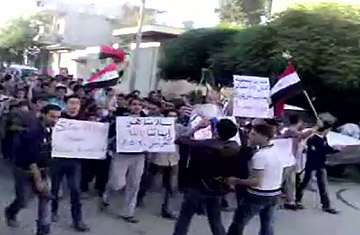
An image grab taken from a YouTube video shows reformist Syrians demonstrating in the northeastern village of Kfar Nabil on May 30, 2011
Leila locks the front door and shuts the entrance to the hallway. As she walks into the innermost room of the house, she lightly taps her bedroom door with the back of her heel, causing it to slowly creak closed. Nervous and silent, the young Syrian revolutionary lowers a solitary window and — to drown out any conversation from prying ears — she tunes a large TV to a state channel playing a Syrian soap opera. The house secure, Leila collapses onto a single bed in the corner of the room and breathes out a sigh. "I can speak now," she says, looking over and smiling.
Leila is one of thousands of covert activists operating in Syria, where protests have been met with violence by security forces during the past 10 weeks. Human-rights groups here say more than 1,000 people have been killed and more than 10,000 arrested. In a country where simply voicing political dissent can lead to imprisonment, the antiregime movement has been pushed underground, turning it into a disjointed mishmash of demonstrators who have no clear plan or strategy.
It has become almost impossible for Leila to communicate with other activists. Landlines are tapped in Syria, and the government has made sure all mobile-phone calls can be traced: a passport or ID-card scan and a thumbprint are needed to buy a SIM card. Social-media websites like Facebook and Twitter played a pivotal role in the recent revolution in Egypt, helping people organize and direct the protest movement via the Internet. But in Syria the opposite is true. Everyone knows that government hackers monitor e-mails, Facebook and Twitter closely.
In fact, the burgeoning protest movement here seems to have increased the government's resolve to spy on its own citizens. Facebook had been blocked in Syria, but the ban was lifted unexpectedly this year — perhaps, as many suggest, because the government realized Facebook could be used as a tool to identify dissidents. Last week, the Washington Post cited unnamed U.S. officials as saying Iran, a close ally of Syria, was sending sophisticated surveillance equipment to Damascus to assist in tracking down opponents on the Internet. The Post reported that the same techniques were used in Iran to quash the prodemocracy Green movement in 2009.
"There is minimal organization now," Leila says, shrugging. "We are so afraid of the security services that we can't do anything. I never use my phone." To know where to go to protest, Leila says, anonymous Facebook users post the name of a suburb where a demonstration has been planned for a particular day, "but not the exact place." Once in the suburb, Leila will meander through the streets, hoping to find the march. If police stop her, she might pretend to be visiting a relative, oblivious to any planned demonstration.
Occasionally there are false alarms. "I try to keep in touch with people I trust. There have been times when I've heard about a protest in an area of the city, but when I arrived, there was nothing," she says. Activists say the secret police sometimes spread rumors of a protest to lure dissidents, only to ambush and arrest everyone on arrival.
Only in large numbers can the protesters avoid arrest. "People hide banners with antigovernment slogans written on them underneath their clothes," Leila explains. "Once they feel safe in a crowd, they will pull the banners out and start chanting for the overthrowing of Bashar [Assad, the Syrian President]."
With foreign journalists barred from entering Syria, the only evidence of the beating and shooting of hundreds of protesters has been amateur videos filmed by demonstrators — often on their mobile phones — and posted on YouTube. "This is what the government really hates," a journalist in Damascus says. "It's the documenting of human-rights violations that could land President Assad in the International Criminal Court."
One activist, who asked to remain anonymous, says plainclothes police have started pretending to be protesters filming the demonstrations, only to later use the footage to identify and incriminate activists. "Many of my friends were arrested and shown footage of themselves at protests," he says, adding that the secret police are given passwords to use in case they are accidentally mistaken for protesters and arrested.
Leila says it is easier for men to rally. The main day for demonstrations has been Friday, the day Muslim men attend sermons at the mosque. "Most men will wait until Friday prayers," Leila says as she pours hot water into a glass of maté, a caffeinated drink popular in Syria. "Even Christians are now going, because they know that the mosque is a safe place to gather," she adds. Once there are enough people, the men flood into the streets and start chanting.
But state security has managed to hamper these after-prayers protests. Men entering mosques where protests have occurred in the past are asked for their identity cards. "It's a form of intimidation. They are saying, 'We know who you are and will come and get you if you protest,' " Leila says. To the anger and frustration of activists, the secret police have started entering mosques and observing sermons from the back of the room, glaring. When protests materialize in the capital, they are dispersed quickly with tear gas and live ammunition. Police raid nearby houses afterward to hunt those who may have escaped arrest, according to activists.
Still, the efforts of Syria's state security services are met with equally unremitting resolve by activists like Leila in what has become a game of cat and mouse. A student in her early 20s, Leila is smart and ambitious. But like the thousands of secret protesters across Syria, she is petrified. "If they find out about me, I could hide," she says, her dark almond-shaped eyes gazing into her glass, "but they will go after my family."
